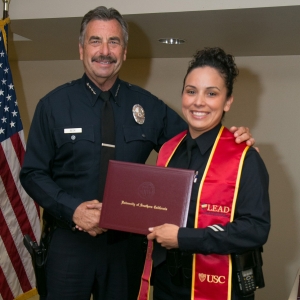Meet the LEAD Graduating Class: Cecilia Frausto
June 08, 2018- Students
Last year, USC launched a partnership with the Los Angeles Police Department to create the Law Enforcement Advanced Development (LEAD) program. LEAD is an online and classroom-based training program in which experts from the USC Suzanne Dworak-Peck School of Social Work and the USC Sol Price School of Public Policy come together to train officers, teaching evidence-based techniques to reduce the need for force and help officers develop communication skills for effective de-escalation.
The LEAD program culminates with the presentation of officers’ capstone projects, which are meant to present implementable solutions to specific community problems such as homelessness, domestic violence, mental illness and human trafficking. As the inaugural LEAD class prepares for its commencement on June 8, we’re highlighting a few outstanding participants and their capstone projects.
“I get through to young people because I’m not judging them, arguing with them, putting them down or pointing fingers—I’m just allowing them to express themselves,” says police officer Cecilia Frausto. “A lot of kids don’t get that at home.”
Frausto’s commitment to establishing meaningful connections with at-risk youth inspired her to participate in the LEAD program. The lessons she has learned over the course of the year inspired her to focus her capstone project on promoting positive reinforcement techniques that can help young victims of domestic violence make constructive choices for their future.
USC Suzanne Dworak-Peck School of Social Work: What does your day-to-day on the force look like, and how has the LEAD program impacted your approach to work?
Cecilia Frausto: Since seeing some of my high school friends and my brother struggle with drugs and behavioral problems, it has always been my mission to help young people. With the LAPD, my job entails coordinating and facilitating programs for at-risk youth.
When you meet these children, you hear their stories and all that they’ve been through, and your heart breaks for them. A common denominator among the young people I work with is a troubled family life. In particular, young men often act out, skip school, get involved in drugs and gangs, or become violent. In many cases, this is because they are lacking a strong male role model, and they are forced to grow up far too quickly in an attempt to fill this gap.
LEAD has informed my understanding of the complex familial, social and psychological issues that affect at-risk youth. After participating in the program, I can better contextualize each young person’s behavior within the framework of his or her personal experiences. I can sit down with them and say, “How can we move forward? Let’s make a plan to get you there that accounts for your unique situation, your experiences and your interests.”
USC: How does your capstone project address these issues relevant to at-risk youth?
CF: The purpose of my project is to help break the cycle of violence by addressing the intersection between domestic violence and youth delinquency.
I want to help young people lay the foundation for healthy family relationships that they can continue to build while encouraging parenting that centers around positive reinforcement. At the same time, I want to create trusting relationships between young people and the police, so that they know we are a resource that’s available to help them cope with difficult situations.
At the LAPD, we have an advocacy program connecting victims of domestic violence to special resources. I’ve found that these resources are primarily family- or mother-oriented, so my project focuses on establishing more support—beginning with basic one-on-one dialogue—for the children of violent households. It’s about listening to what they have to say, making them feel important and helping them understand that violence and abuse are never acceptable.
USC: How are you putting these principles into practice in your work?
CF: I just do what’s right in my heart. I don’t do anything with the hopes of being promoted or recognized by the department. I took this job to help people as much as possible. Sometimes it means that money comes out-of-pocket, or that my partner and I fill a truck with donated clothes from our own families to give to young people in need.
Our department also has a partnership with the nonprofit youth organization On A Mission, Inc. Through this program, we’ve taken young people to Washington, D.C., and to colleges across the country. This April, we even led a trip to China for 21 young people from South Los Angeles. We just want to show them that this is obtainable: you can travel, you can go to college, you can achieve your goals. If I’m able to help change just one of their lives, then I am satisfied.
To reference the work of our faculty online, we ask that you directly quote their work where possible and attribute it to "FACULTY NAME, a professor in the USC Suzanne Dworak-Peck School of Social Work” (LINK: https://dworakpeck.usc.edu)
